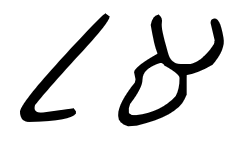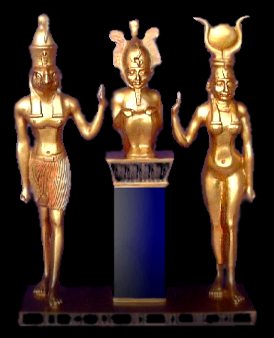Idols as Mental Substitutes in the Mind
The First Commandment of the Covenant of the Most High, which He made with the nation of Israel states, “You shall have no other gods before Me”, meaning “no gods are to be brought before the Creator”. This interpretation is not grounded well in the Hebrew text, as the connection between “other gods” and “before Me” is not well established in such a translation. We will explain in the following that this is not the way to interpret the verse, because although the English translation is easy to read and understand, nevertheless it is inaccurate and does not fully convey the original message intended in the Covenant. Because when we examine the matter closely, we will find that there is more to it than that.
It is the object of this work to explain the Hebrew text of the First Commandment. This work has also a second object: to interpret its literal translation which is not distinctly explained by the commentators and expose certain misconceptions that still exist. We will explain the reason for this in due course. With that being said, we are asking the reader to consider what we intend to say.
It all began with the golden calf, to which we now turn.
The golden calf as a substitute for the Creator
“A copy of the truth is no longer truth; it is a copy.” Navah
An idol is any material effigy that is worshipped, that is, bowed down before. An idol can also be someone who is adored blindly and excessively. But we should not err to conclude that an idol is a mere material object. An idol can be any ideal instance, a perfect embodiment of a concept, or a mental image created in the human consciousness. Thus, an idol is not limited only to the pagan “gods” but by implication it can also be a false image of the true and only Elohim; image created by man-made conceptual and abstract philosophy.
We all know the story of the golden calf. When the people saw that Mosheh delayed returning to the camp, they gathered together to Aharon to make “elohim” that would bring them to the Land (Exo 32:1-3). Aharon told them to bring all gold to him, and when they did as he told them, he took it from them and made a molten calf. And the people said,
This is your Elohim, Israel, that brought you out of the land of Egypt!
And Aharon built an altar before the golden calf and called out,
Tomorrow is a festival to Yehovah. (Exo 32:4-5)
Aharon presented the golden calf to the people as Ele Elohecha Israel, “This is your Elohim, Israel”. And that was the sin: defining YHVH Elohim as “this”, namely, a thing. Defining the Sovereign of the universe as an object, whether physical or otherwise, is the beginning of idolatry. We need to know that every time the ancient Hebrews wrote the name El (short form of Elohim) in the ancient Hebrew pictographs, they saw a picture of an ox. The Hebrew word אֱלֹהִים, elohim, comes from the word אֵל, el, having the same meaning. The pictograph of El (letters aleph and lamed) is a picture of an ox head and a shepherd staff which together represent strength, as the ox is a strong animal and the shepherd’s staff (as the king’s staff) is his authority over the flock. Combined they give the idea of someone of power and authority, hence Elohim which literally means “Powers” or “Forces”.

The Hebrew word “El” (Elohim) written in ancient Hebrew pictographs “aleph” (depicting a head of an ox) and “lamed” (depicting a shepherd staff).
When these two pictographs are read in a context, it is inevitable for an ancient Hebrew reader to associate them with El[ohim]. So, when the people made the golden calf, they might have tried to depict Elohim of Israel using the symbols for an ox, which for them must have been the most natural way to refer to Him. Thus, the golden calf represented a carved image, a mask, or a physical likeness of the invisible Elohim. We pointed out that the people dedicated the molten calf to YHVH Elohim. And the intelligent reader has noticed that an idol (as the golden calf) served as a covering or a face mask the people molded for Elohim. But do we know that today other people (this time the gentiles) have molted golden calf mask on Elohim?
Idolatry as a mental sin of thoughts
Ibn Ezra stated that there are many people who think that with the exception of idol worship there are no sins connected to the sin of thoughts. The truth of the matter, continues he, is that the idol worship in the mind is worse than all the other mental sins put together. What Ibn Ezra is saying put in other words is this: the idol worship in the mind is as idolatry as the making physical objects and worshiping them as if they were “deities”. And indeed, the false images of the Creator of what He is according to theologies is even worse than the worshiping of objects. Ibn Ezra thus identifies three kinds of idolatry.
The first kind of idolatry is worshiping the invisible part of the creation, the angels, for the ancient thought that the angels, such the angels Michael, Gavriel and others, had their own power and authority over them to do good or to do evil, such as the one who is called the satan (the adversary). These angels are referred to in the Hebrew Scripture also as elohim for they indeed possess power, yet they do not have agenda of their own; they are merely servant of the One who created them. The second kind of idolatry appeared when people began worshiping the visible creation such as the sun, the moon, and the stars ascribing to them supernatural properties. The third kind of idolatry appeared afterwards when people began worshiping the presentations of the Creator in the form of physical objects, such as figurines, and later on icons, or mental presentations of Him in the form of thoughts, ideas, and doctrines of what Elohim is: these are the most persistent idols of them all, because they are created in the mind and reside there.
Today people who believe in the Creator of the universe are not on the same level of faith. Many believe what they have heard about Him, and they believe in Him because their teachers have told them so. They also believe in a certain counterfeit image of Elohim, whose term cannot be found anywhere in the Hebrew Scripture (Tanak); an invented image whose word does not even exist in the Hebrew language, but they worship it anyway.
Better than them are those who believe because of what they have read in the Hebrew Scripture, which Elohim gave to Mosheh and the prophets, and rightly so. But few will come to know the Most High by learning His ways, after what Mosheh stated, “Show me Your way, and let me know You” (Exo 33:13). For indeed the Creator YHVH is not some distant deity beyond our reach but knowable through His direct revelation at Sinai and through His written Word, the commandments of the Covenant and the Torah He gave us to do and live by, as stated in Eze 20:11.
When the Most High descended in fire from heaven on the mountain which was all in smoke like the smoke of a furnace, and proclaimed from above the mountain, “I am Yehovah your Elohim”, and all the mountain trembled exceedingly, only one who is of great understanding can discern that which follows in the Covenant. For the proclamation, “I am YHVH your Elohim”, is sufficient for the intelligent reader to believe and follow Him.
The Ten Commandments or the Ten Statements
The Covenant which YHVH gave to Israel through the hands of Mosheh at Mount Sinai is commonly known as the Ten Commandments or Decalogue. But these terms cannot be found anywhere in the Scripture unless a loose translation such as KJV is referred to. In Hebrew, the term “the Ten Commandments” is asseret devarim, as found in Exo 34:28, Deu 4:13, and Deu 10:4. Some translations as JPS renders asseret hadevarim as “the Ten Words”. But neither of these terms is quite accurate, because the Hebrew word behind “commandments” is not mitsvot, as it should be expected, but devarim, which means “words”. But then we are faced with another issue because neither are there ten words, for there more than ten words in the Covenant, nor are there ten laws unless some consider the prohibitions in Exo 20:3-6 as one law.
Alternative translations of asseret ha’devarim are “the ten sayings”, “the ten issues”, or “the ten matters”, which reflect closer translations of the Hebrew asseret ha’devarim. But still, these are not accurate renderings since “sayings”, “issues”, and “matters” terms are too general. So, how are we to translate the Hebrew asseret ha’devarim? Perhaps, the best interpretation of the ten legal aspects of the Covenant is provided by Ibn Ezra who has formulated them as “The Ten Statements”, which we will adopt hereafter. We also believe that this term presents most accurately the legal contents of the Covenant.
The First Statement of the Covenant
The First Statement is the foundation upon which the Covenant of YHVH rests. It is for this reason that it is said,
I am Yehovah your Elohim, who brought you out of the land of Egypt, out of the house of slavery.
It is immediately followed by the admonition: “You shall have no other gods”. Along with the Third Statement, “You shall not bring the Name of Yehovah your Elohim to naught”, the Covenant explicitly distinguishes who is to be revered and why. If these three statements are removed from the Covenant, the rest can be freely applied to any “deity” out there, for they all teach respect of parents, not to murder, steal, commit adultery, etc. But there is only One who says that He brought Israel out of Egypt; only One whose Name is Yehovah, and only One who asks His people to join Him in the observance of the seventh day of the Creation. For indeed the Creator clearly defines the Sabbath day (Shabbat) as a sign between Him and His people—Exo 31:13, Exo 31:17, Eze 20:12, Eze 20:20. It is for this reason that the Name of the revered Most High is written in the Covenant. But when some have attempted to take the Set-apart Name of the Creator out of the Covenant and replaced it with substitutes, and others who moved Shabbat from the seventh day to the first day of the week, they have thus violated the Covenant by removing the sign between Him and His people.
What it takes to misread the Covenant
“In order to understand the hidden things, we need to first understand the visible ones.” Navah
The Covenant of YHVH Elohim begins with the First Statement, which reads in translation thus,
I am the LORD thy God, who brought thee out of the land of Egypt, out of the house of bondage. Thou shalt have no other gods before Me. (Exo 20:2-3 JPS)
Note: “You” is formulated in a very personal way here expressed by the second-person masculine singular in “You shall have no other gods” and elsewhere in the Covenant. While most of the interpretations of the First Statement have separated “You shall have no other gods before Me” from “I am YHVH you Elohim, etc.”, the truth of the matter is that they are one statement that gives the beginning of the Covenant, and this is how we will treat it in this study.
It is impossible to interpret the First Statement, “Thou shalt have no other gods before Me”, to mean “other gods” in a sense of “gods other than I”, since it will suppose that there are “gods” along with Him. But rather, the Hebrew אֱלֹהִים אִחֵרִים, elohim acheirim, is to be interpreted to mean “gods of the others”, that is to say, “the gods of the idol worshippers, which they have made for themselves, as we find the parallel command in Leviticus that reads thus,
Do not turn to idols, and do not make for yourselves molded elohim. I am Yehovah your Elohim. (Lev 19:4)
The “gods” in Exo 20:3 are called הָאֱלִילִ֔ים ha’elilim and אֱלֹהִים elohim in Lev 19:4, whose literal meaning is nothings, things of naught, hence, idols. Therefore, the correct translation appears to be, “Do not have for yourselves the elohim of the others“. But the sense would not allow it. For even if we could suppose that was intent of the Covenant, we need to admit that such a translation will be made out of theological rather than linguistic perspectives, because grammatically speaking, “gods of others” in Hebrew would be elohei acheirim, אֱלֹהֵי אֲחֵרִים, not אֱלֹהִים אִחֵרִים, elohim acheirim, “other gods”, as it appears in Exo 20:3.
The other Hebrew word which we will examine is the preposition עַל al. It means above, over, upon, on. But in JPS עַל al appears as “before” denoting a god placed before or against the true Elohim. What is the significance of this change? This Hebrew comes from the verbal root עָלָה alah, which literally and figuratively means to arise (up), to ascend up, or to bring up, hence עַל al means above, upon, on. With this meaning עַל al, can be found in Gen 1:7, Gen 6:1, and Gen 8:1. A noun which is derived from the root עָלָה alah, is עָלֶה aleh. Aleh means a leaf (as coming up on a tree), or collectively it means foliage. Therefore, the idea which the preposition עַל al brings is that something is placed on the top of something else.
The other key Hebrew word which we will translate literally is the word פָּנִים paniym. In JPS, it is translated as “Me” referring to YHVH Elohim, hence “before Me”. But this is not what we read in the Hebrew text. First, the word פָּנִים paniym does not mean “me” but “faces”. This word is used in plural but always to mean singular, a face. It comes from the verbal root פָּנָה panah, which means to turn, by implication to face, that is to say, to appear, look (literally and figuratively). Hence the noun means faces, appearance, or presence, since through many faces (of variety of emotional conditions) one appears, looks, or is perceived by the others. Also, with the prepositional prefix עַל al, the noun פָּנִים paniym, “faces”, commonly translated as “before me” or “before my presence”, literally means “upon My Face”. A compound word that is derived from פָּנָה panah, to face or appear, and אֵל el (a short form of Elohim, “Almighty”) is the name of a place East of Yarden River, Peniel or Penuel, “Face of the Almighty”, where the patriarch Ya’akov saw Elohim face to face (Gen 32:30-31). The Torah’s use of words is never incidental.
When we keep these considerations in mind, we will also understand the literal and plain translation of the First Statement of the Covenant therefore will be,
I am Yehovah your Elohim, who brought you out of the land of Egypt, out of the house of slavery. There shall not be to yourself no other elohim upon My Face. (Exo 20:2-3)
How does this translation, namely, “upon My Face”, change the universally accepted “before Me”? In many ways.
It will be clear to the reader that the perception of prohibition of idolatry is expressed by the phrase “upon My Face”. We must therefore view this verse as telling us that such an intent is intolerable. The correct interpretation according to the literal meaning of the Hebrew text is that the verse here thus states that excepting YHVH Elohim only, we are to have neither angels, who are also called elohim, nor any objects, physical or mental, to which we are to bow down. And while this will be the most obvious interpretation of what is conveyed in the very beginning of the Covenant, there is another, even subtle, distinction in the First Statement. We will now return to complete what we commenced to explain in the beginning.
From what we stated in the introduction of this study, namely, the lesson of the golden calf, we understand that YHVH our Elohim prohibits us to have anything, even in our minds, false images, counterfeit ideas, concepts of religions, i.e., anything that is contrary to how YHVH has identified Himself in the Torah and the Prophets; anything else is idol-worship in the mind, “mask” upon His Face.
By laying out these factors, a conclusion follows naturally from the plain words of the Hebrew text. YHVH Elohim admonishes in the very First Statement of His Covenant not to make for us any image upon the His Face. Because in the Second Statement of the Covenant, the Most High prohibits all kinds of idol-worship regardless, whether they are carved images of what is in the heavens or on the earth, or in the waters, or abstract images of our own imagination, or counterfeit of the religion. YHVH Elohim alone is to be revered.
Knowledge known to only a few will die out. If you feel blessed by these teachings of Time of Reckoning Ministry, help spread the word!
May we merit seeing the coming of our Mashiach speedily in our days!
This page contains sacred literature and the Name of the Creator. Please, do not deface, or discard, or use the Name in a casual manner.


